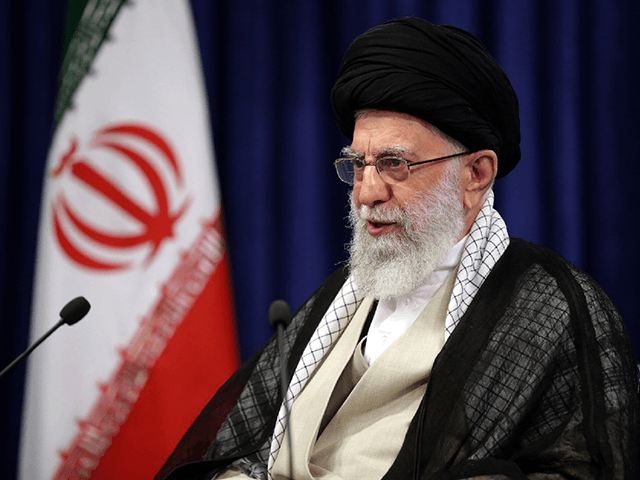Iranian dictator Ayatollah Ali Khamenei conceded on Wednesday that the regime documented “less than expected” turnout in last week’s special presidential election – but insisted that low turnout was not the result of an international boycott campaign against the sham vote.
The Iranian regime reported a turnout of about 40 percent in Friday’s election, a record low. Some reports indicate, citing near-empty voting stations and local statistics, that the true turnout for the election may have been much lower. Friday marked the second presidential election in a row with record-low turnout.
The Iranian theocratic regime does not offer the legitimate right of suffrage to its people. It instead organizes sham elections for the presidency and other top positions. For the presidential seat, a “Guardian Council” of clerics and others loyal to Khamenei determines who appears on the ballot, eliminating the vast majority of contenders to ensure voters can only elect someone committed to perpetuating the 46-year-old tyranny in power. This year, 95 percent of would-be candidates were not allowed on the ballot.
While some candidates pose as “moderates” and other as “hardliners,” all presidents are subordinate to Khamenei and candidates must be loyal to the regime to appear on the ballot.
The June 28 election occurred as a result of the death of incumbent “hardliner” Ebrahim Raisi, who perished in a mysterious helicopter accident alongside Foreign Minister Hossein Amir-Abdollahian in May.
Khamenei remarked on the low election turnout last week during remarks in Tehran on Wednesday in anticipation of a second round of voting on Friday. The presidential election is heading for a rare runoff vote on July 5 after no candidate successfully obtained over 50 percent support on Friday. The top two candidates – “moderate” Masoud Pezeshkian and “hardliner” Saeed Jalili – will appear alone on the ballot and the one with the most votes, according to regime election officials, will win.
According to the regime-affiliated Tasnim News Agency, Khamenei conceded that turnout was disappointing for Tehran. He ardently denied, however, that calls to boycott the election on the grounds that it was neither free or fair did not contribute significantly to low turnout.
“Supposing that the people who did not vote in the first round (of the presidential election) are opposed to the establishment is a totally wrong interpretation,” Tasnim quoted Khamenei as saying.
Khamenei went on to proclaim voting the “backbone and source of pride for the Islamic Establishment,” according to state outlet PressTV.
“This election is very important and anyone who loves Islam, the Islamic Republic, the progress of the country, the improvement of the situation and [favors] bridging the gaps should show this interest by participating in the election on Friday,” Khamenei declared.
A translation by the independent outlet Iran International indicated that Khamenei blamed the low turnout on unspecified “problems and difficulties,” a shift in tone from previous elections in which Khamenei simply dismissed non-voters as “lazy.”
“Don’t be lazy, don’t neglect, don’t underestimate; participate in all corners of the country,” Khamenei reportedly urged while voting on Friday.
Whether or not to boycott the runoff vote is the subject of heated discussion among Iranians who oppose the regime given the surprise success of “moderate” Pezeshkian in the first round. Pezeshkian allegedly obtained 42.4 percent of the vote last week, significantly higher than any other contender and successfully knocking out the presumed frontrunner, “hardliner” former Islamic Revolutionary Guard Corps (IRGC) officer Mohammed Bagher Qalibaf. Notably, his top finish followed two of the approved “hardliner” candidates dropping out in an attempt to unify the radical Islamist vote.
Pezeshkian’s attempts to appeal to voters dissatisfied with the regime have not discouraged activists from calling for a boycott. A group of 50 dissident leaders issued a joint statement following the first round of voting describing the election as a false choice between two Khamenei loyalists.
“Any political participation or vote for handpicked and powerless candidates is a dark and bitter joke,” the activists wrote.
Some prominent Iranians have suggested that supporting Pezeshkian is a worthy cause to avoid Jalili obtaining the presidency, and potentially preventing Iran from falling further into totalitarianism. “Moderate” former President Mohammad Khatami is among those voices, issuing statements this week describing low turnout as a “clear sign of the public’s dissatisfaction with the current state of affairs.”
Khatami described not voting as “harmful to the nation” and electing Pezeshkian, who he endorsed, as an “unfinished task.”
Pezeshkian has also attracted the support of the last “moderate” president, Hassan Rouhani, and former Foreign Minister Mohammad Javad Zarif.
Both Pezeshkian and Jalili have since issued statements attempting to convince Iranians to show up at the polls, treating boycotters as an untapped constituency that could potentially win either of them the election.
“If the current situation is far from the desired level of public participation, we must motivate people with a plan to move towards the desired participation,” Jalili said, according to Iran International.

COMMENTS
Please let us know if you're having issues with commenting.